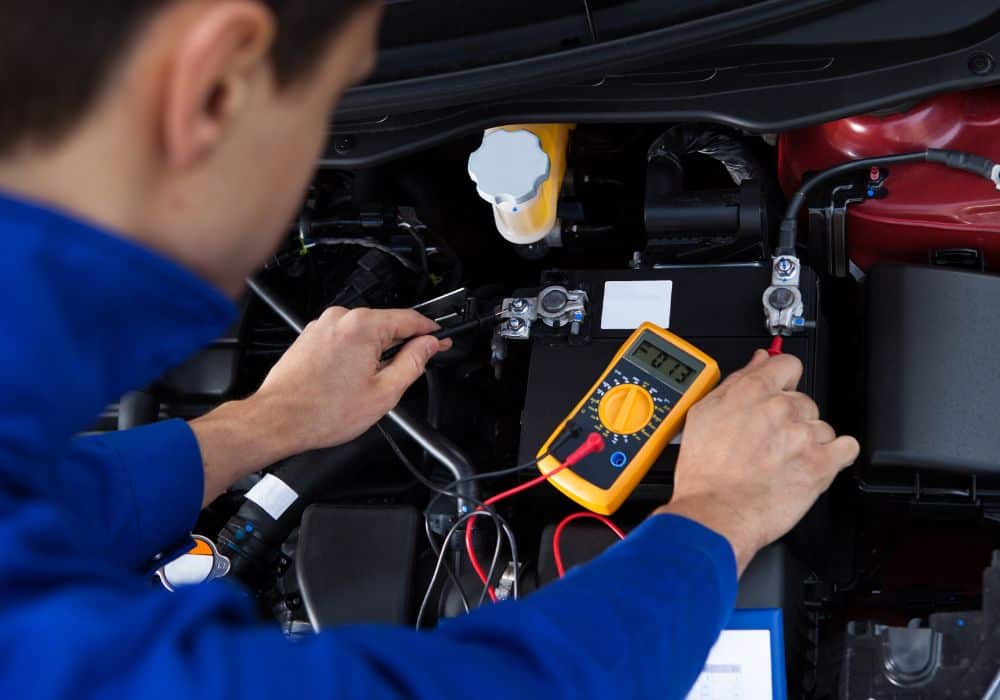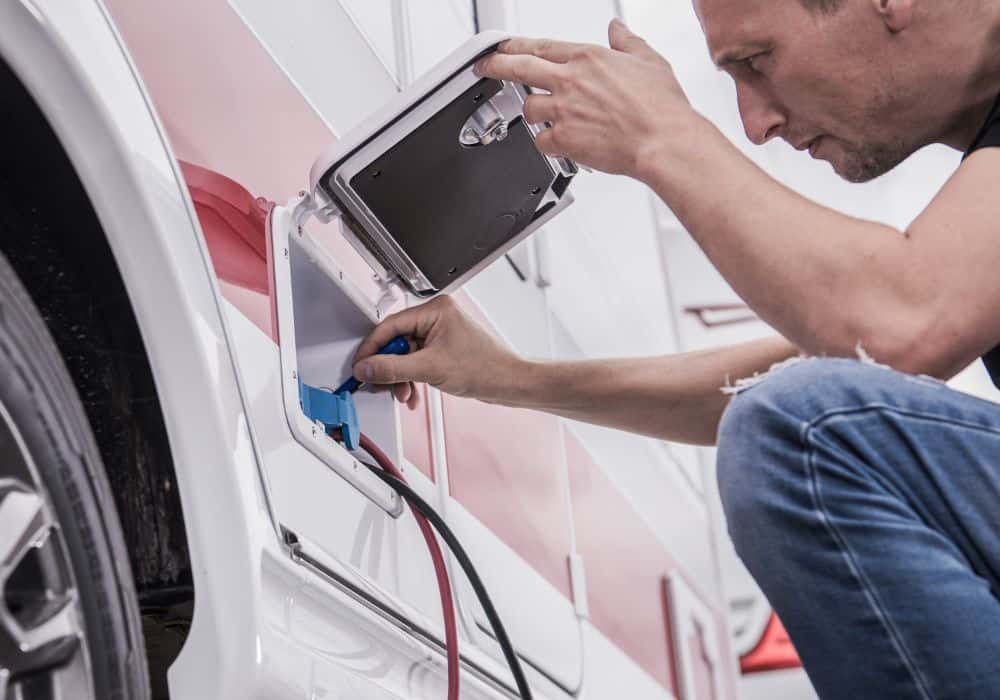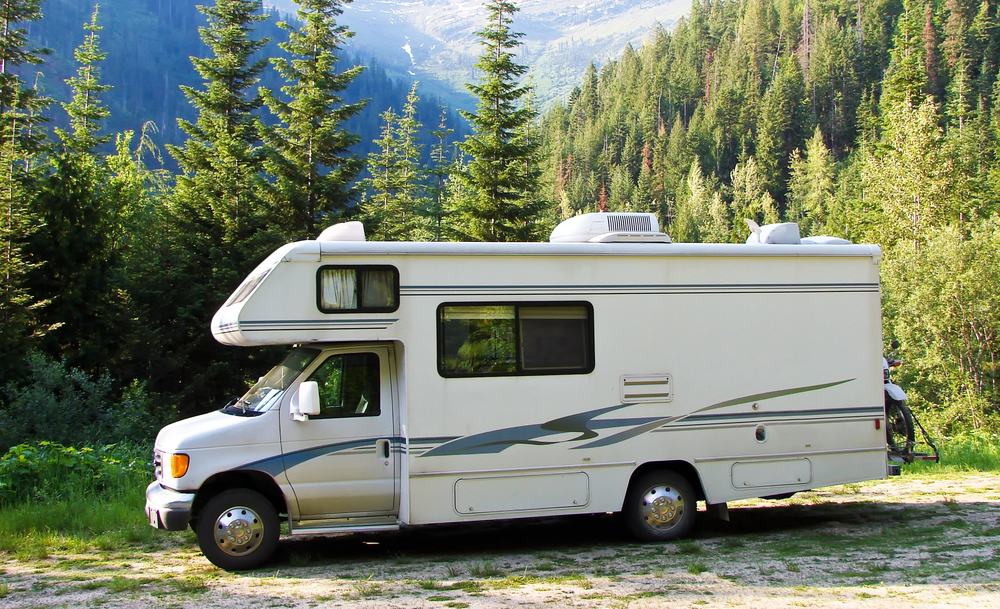If your RV converter isn’t charging your battery, it could be a number of things causing the problem. In this blog post, we’ll discuss some of the most common causes and offer some troubleshooting tips to help you get your converter back up and running. So, if you’re dealing with a dead battery in your RV, keep reading for some helpful advice!
Let’s get started!
Table of Contents
What is an RV Converter and What Does it Do?
The first thing you’ll want to know is what an RV converter actually is and what it does for your RV battery.
An RV converter is a device that converts 110-volt AC power from your RV’s shore power hookup or generator into 12-volt DC power. This DC power is then used to charge your RV’s batteries and run any 12-volt appliances in your campers, such as a refrigerator and the overhead lights.
RV converters are typically located inside the RV, often near where the shore power cord or generator hookup is located. If you’re not sure where yours is, take a look around under your rig’s countertops or in storage compartments until you find it. You can also check with your manufacturer or read about it online.
How Can You Test Your Battery System?
Once you know where your RV converter is located, it’s time to start troubleshooting. The first step should be to check the condition of your battery system.

Voltmeter
A simple way to do this is with a voltmeter. This device can measure current and voltage in both AC and DC systems and help detect any problems in the circuit. You’ll want to connect your voltmeter across the positive and negative terminals on each battery before turning the device on.
Doing this will allow you to see if there is an adequate charge across the batteries, or if there are any other issues that need to be addressed before moving forward.
Multimeter
If you need to do more than just check the voltage, another helpful tool for testing your RV’s battery system is a multimeter. This device can measure current, voltage, and resistance in both AC and DC systems. It will also allow you to check the connections between your RV’s batteries and the converter charger for any problems.
Signs that Your Battery isn’t Fully Charged
Of course, if your voltmeter or multimeter shows that the battery isn’t fully charged, that is a dead giveaway. But there are a few other signs that alert you to knowing that something is wrong with your battery.
- Your travel trailer’s internal lights or RV headlights may flicker when they should be shining brightly.
- Another sure sign that something is wrong with the battery is if your RV’s appliances are not working correctly.
- If you notice your RV won’t start or anything else amiss with the electrical system while you’re engine is running, chances are that something is wrong with your battery.
Common Causes of an RV Converter Not Charging Battery
It’s very frustrating when you discover that the RV’s power converter isn’t charging the battery. If you find yourself in this position, there are a few different things that can cause this issue. Here are some of the most common culprits and what you can do to fix them:

1. A Blown Fuse or Tripped Circuit Breaker
One of the most common reasons for an RV converter not charging the battery is a blown fuse. On an RV, the fuses are designed to protect the electrical system from damage due to shorts, surges or overloads. If a fuse has been blown, it will need to be replaced in order to restore power to your converter and charge the battery.
If you suspect this is the case, check the fuse box located near the electrical panel. If you find a blown fuse, simply replace it with a new one and see if that does the trick.
Similarly, double check the breaker panel box just in case because there might be a circuit breaker tripped. This issue is incredibly easy to fix – all you need to do is locate the tripped circuit and flip the switch into the ‘ON’ position.
2. Damaged Wiring
If there is damaged wiring somewhere between your RV’s shore power hookup and the converter, that could be causing the problem. Inspect all of the wirings through the entire circuit for any signs of damage or lose connections and repair or order a replacement as necessary.
However, if you’re RVing at an RV park and the culprit is their hookup pedestal, then you will want to let them know about the issue and ask about moving to a different camping spot.
3. Battery Terminal Corrosion
Another common issue is corrosion on the battery terminals. This can happen when the battery is left idle for an extended period of time or if it was stored in an area with moisture. Corrosion can cause a voltage drop, or a bad connection for the battery cables, and prevent your converter from charging the battery.
To clean corrosion from the terminal posts, try using a wire brush or a paste made of baking soda and water. Make sure to wear gloves and safety glasses when you’re working with the battery as it can be dangerous.
4. Converter’s Thermal Sensor Is Activated
Some converters have an internal component called a thermal sensor (also called a temperature sensor) that will activate the converter cooling fan or shut the unit down entirely if it gets too hot. This is a safety feature that prevents the converter from overheating and catching fire.
If this is the case, you’ll need to find a way to cool down the converter before it will start working again.
5. Converter’s Cooling Fan Has Failed
Related to the previous point, if your converter has an internal cooling fan (some do, some don’t) and that fan has failed, then it could be causing the converter to overheat and stop working. If this is the case, you’ll need to replace the fan before the converter will start working again.
How Do I Replace my Faulty or Broken RV Converter?
If you’ve identified a faulty or broken RV converter, then you’ll need to replace it. Fortunately, replacing an RV converter is not too difficult and usually involves the following steps:
- Turn off the power to your RV’s battery system at the 12-volt and 120-volt disconnect switches.
- Disconnect all of the wirings from the old converter.
- Install the new RV converter, making sure that all of the wires are connected correctly according to its instructions.
- Reconnect any other devices and accessories like AC power plugs, 12-volt plugs and inverters into their respective ports on the new converter charger.
And that’s it! Once you’ve finished installing the new converter, turn the power back on and your RV’s battery system should be charging again.
FAQs
Now that we’ve gone over some of the most common reasons for an RV converter not charging the battery, let’s answer some frequently asked questions about RV converters and RV batteries.
Q1: How Do I Charge My RV Battery if It is Dead?
If your RV battery is dead, the best and quickest way to charge it is with an external battery charger. This device will provide a direct current of 12-volts DC to charge your battery back up in no time.
Q2: What are the Signs that my RV Converter is Not Working?
There are a few signs that your RV converter might not be working properly, including:
- Your RV’s batteries are not charging when plugged into the shore power.
- The converter is hot to the touch.
- There is melted plastic or burned wires around the converter.
- The converter makes strange noises.
Q3: How Often Should I Replace my RV Converter?
Most converters will last for several years, but it’s a good idea to inspect them regularly for any signs of wear and tear, especially if your RV is a lot older and you’ve needed to replace many other parts. If you notice any problems, it’s best to replace the converter as soon as possible.
Conclusion
There you have it – almost everything you need to know about your RV converter and its relationship with your motorhome’s battery.
You’ve learned a lot about how to troubleshoot the issue and fix it, but if you’re still unsure of how to replace a converter or another part, it may be beneficial to consult a professional RV technician. They can diagnose the issue, do any necessary repairs and install the new converter safely. It’s always a good idea to have a professional check the electrical system in your RV to make sure everything is running safely and correctly.
Good luck! Happy RVing!
Do you have any other questions regarding how your RV converter affects your battery? Let us know in the comments below!
